ART IDENTITY MIGRATION
Mornington Crescent Summer Morning II Frank Auerbach, born Berlin 1931. Sent to England by his parents in 1939 to escape the Nazi horrors


Mornington Crescent Summer Morning II Frank Auerbach, born Berlin 1931. Sent to England by his parents in 1939 to escape the Nazi horrors

Ben Uri Gallery and Museum is delighted to present Art, Identity, Migration , a display of highlights from the permanent collection featuring paintings, drawings, collage, and sculpture by 32 artists of Jewish and/or immigrant origin from across the past century.
This exhibition explores – in reverse chronological order – three principal waves of migration to Britain, illustrating the history, width and breadth of the institution and its collection with representative works by artists including Guler Ates, Frank Auerbach, David Bomberg, Benedict Enwonwu, Eva Frankfurther, Mark Gertler, Josef Herman, Tam Joseph, Hormazd Narielwalla, Lancelot Ribeiro, Zory Shahrokhi and Alfred Wolmark.
Ben Uri is a small, purposeful, scholarly institution that uses art and technology differently to deliver distinctive national programmes. Ben Uri was founded in Whitechapel in 1915 by Russian-Jewish artist Lazar Berson to support fellow Jewish immigrant artists working outside the cultural mainstream.

In 2002, it relaunched in a new gallery, widening its focus to embrace immigrant artists from all ethnicities, nationalities, and religions, who have made a distinct
contribution to British art since 1900.
In 2018 the Museum published a transformative Sustainability and Public Benefit Strategic Plan, making a prescient shift to create the first full-scale digital museum (benuri.org) and Research Unit (buru.org.uk) to complement Ben Uri’s vibrant gallery programming. Its Arts and Mental Health department develops researched art interventions and digital programming for the 70+ demographic, often living in social isolation and/or with dementia.
The redefined, fully digitised Ben Uri Collection (benuricollection.org.uk) uniquely reflects the wider British immigrant contribution with some 880 works by 390 artists, 70% immigrant and 29% women, from 45 different countries of birth.
Ben Uri extends huge thanks to the London Art Fair, and its sponsors, for this wonderful opportunity to share our collection, research unit and mission and for all their generous help and support.
David J Glasser ChairFor further information please contact davidg@benuri.org
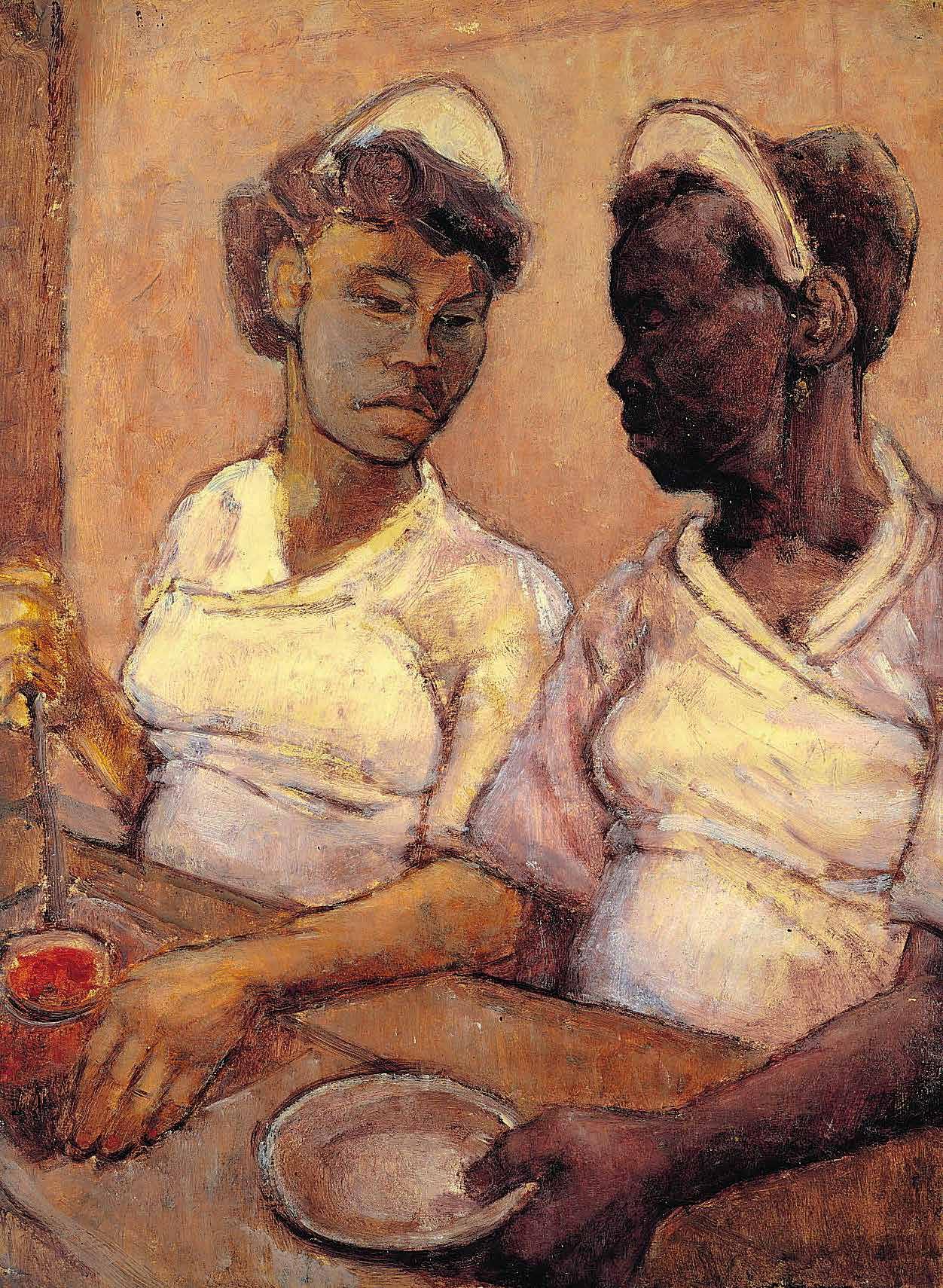
As the official Museum Partner of the 2023 London Art Fair, Ben Uri Gallery and Museum is delighted to present the exhibition Art, Identity, Migration.
This exhibition explores – in reverse chronological order –three principal waves of migration to Britain, illustrating the history, width and breadth of both the institution and its collection, showcasing paintings, drawings, sculpture and collages by 32 artists of Jewish and/or immigrant origin from across the past century. The display reflects the museum’s distinctive academic and artistic focus on the study and recording of the Jewish and immigrant contribution to British visual culture since 1900, via the Ben Uri Research Unit’s digital database (buru.org.uk).
Ben Uri is a small, purposeful, scholarly institution that uses art and technology differently to deliver distinctive national programmes. Founded in Whitechapel in 1915 by Russian-Jewish artist Lazar Berson to support fellow Jewish immigrant artists working outside the cultural mainstream, it initiated its collection in 1918 and opened its first gallery in 1925, but effectively closed 70 years later in 1995. In 2002, it relaunched in a new gallery, widening its focus to embrace immigrant artists from all ethnicities, nationalities and religions, who have made a distinct contribution to British art since 1900.
In 2018 the Museum published a transformative Sustainability and Public Benefit Strategic Plan, making a prescient shift to create the first full-scale digital museum (benuri.org) and Research Unit (buru.org.uk) to complement Ben Uri’s vibrant gallery programming. The redefined, fully digitised Ben Uri Collection (benuricollection.org.uk) uniquely reflects the wider British immigrant contribution with some 880 works by 390 artists, 70%
(1933 Bombay [now Mumbai] India – 2010 London, England)
King Lear, 1964, Oil on canvas
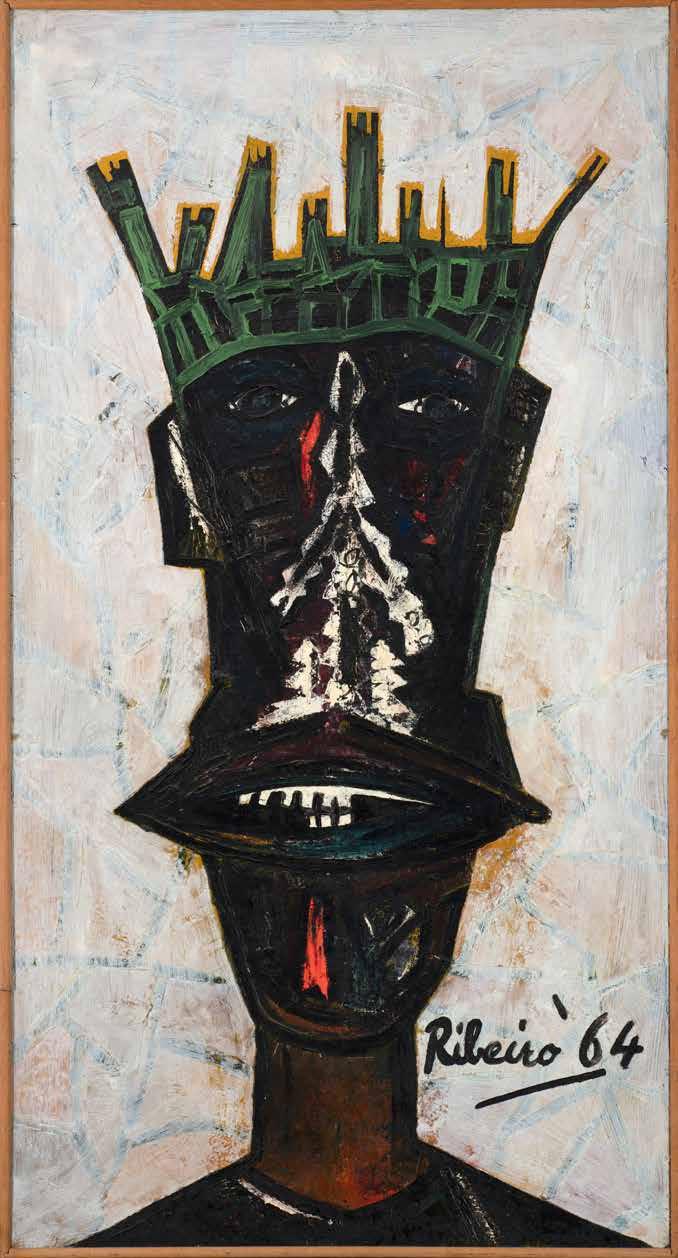
Ben Uri Collection, Presented by the Estate of Lancelot Ribeiro 2022
Immigrated to Britain 1950
immigrant and 29% women, from 45 different countries of birth. Our Arts and Mental Health department develops researched art interventions and digital programming for the 70+ demographic, often living in social isolation and/ or with dementia.
The display opens with works by artists either from or representing richly diverse non-European backgrounds, who completed their art studies in post-Second World War Britain. It begins with a vivid portrayal of The Dancer (Agbogho Mmuo – Maiden Spirit Mask) , one of the characters from the Nigerian masquerade, by pioneering African modernist Ben Enwonwu, reflecting his Igbo heritage; flanked by a bold King Lear by Indian Expressionist Lancelot Ribeiro.
Born into a Catholic family from Goa (then a Portuguese colony) in Bombay (now Mumbai), Ribeiro is the subject of an upcoming exhibition at Ben Uri Gallery in 2024. His friend, Indian poet, translator and critic R. Parthasarathy, rightly observed that Ribeiro’s ‘true subject’ was his ‘origins – Goan roots, estrangement from India, and exile in London’.
Born into a Zoroastrian Indian household in Mumbai, some 46 years after Ribeiro, printmaker and sculptor Hormazd Narielwalla’s multi-panel collage, The Bands of Pride, references both Edward I’s forced expulsion of his Jewish subjects from England in 1290, and positive Jewish resettlement in the historic ‘Blue City’ of Chefchaouen in Morocco. While Eastern-Turkish artist Güler Ates, who is from a Zaza ethnicity, in Home Performance I, set in Lapa, Rio, centres on a veiled figure crossing the foreground pulling a house behind her, embodying the artist’s central belief that we carry our ‘mental home … wherever we go’.
(1963 Tehran, Iran – lives in Middlesex, England) Revolution Street 2, 2019, Pen and ink and gold pen on paper Ben Uri Collection, Commissioned for the Ben Uri Collection 2018 Immigrated to Britain 1979
Two contemporary artists commissioned by Ben Uri highlight universal issues around experiences of displacement, exploitation, gender oppression and breaches in human rights. Iranian-born Zory Shahrokhi’s drawing, Revolution Street 2 , commissioned in 2018, depicts a swallow – a worldwide symbol of freedom and migration – contained within a diamond-shaped textile suggesting a headscarf. It commemorates ‘the Girls of Enghelab (Revolution) Street’ movement that started in Tehran after a woman removed her headscarf in protest against the compulsory wearing of the hijab.
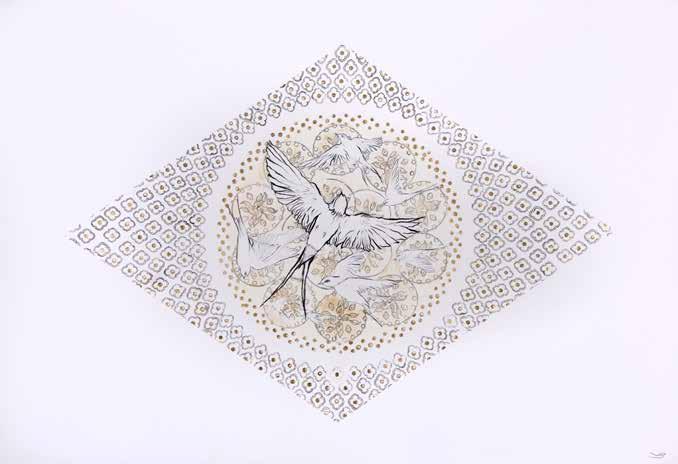
The current civil unrest in Iran is in protest against exactly the same restriction of freedom of choice.
Edwin Mingard’s video, commissioned in 2015 to mark Ben Uri’s centenary, generously supported by the Heritage Lottery Fund, narrates, Break , the story, based on real-life interviews, of Muslim Egyptian migrant Yousef as he struggles to survive in the big city. (Certain costumes, scenes and shots in the film were inspired by or responded to artworks from the Ben Uri collection including Mark Gertler’s Rabbi and Rabbitzin and
Dominican-born artist Tam Joseph, who migrated to England in 1955 at the age of eight, highlights the arbitrariness of national identities in his witty, prescient The Hand Made Map of the World, in which he playfully reorders conventional geographies, blurring boundaries and suggesting new and unexpected possibilities for the world political map.
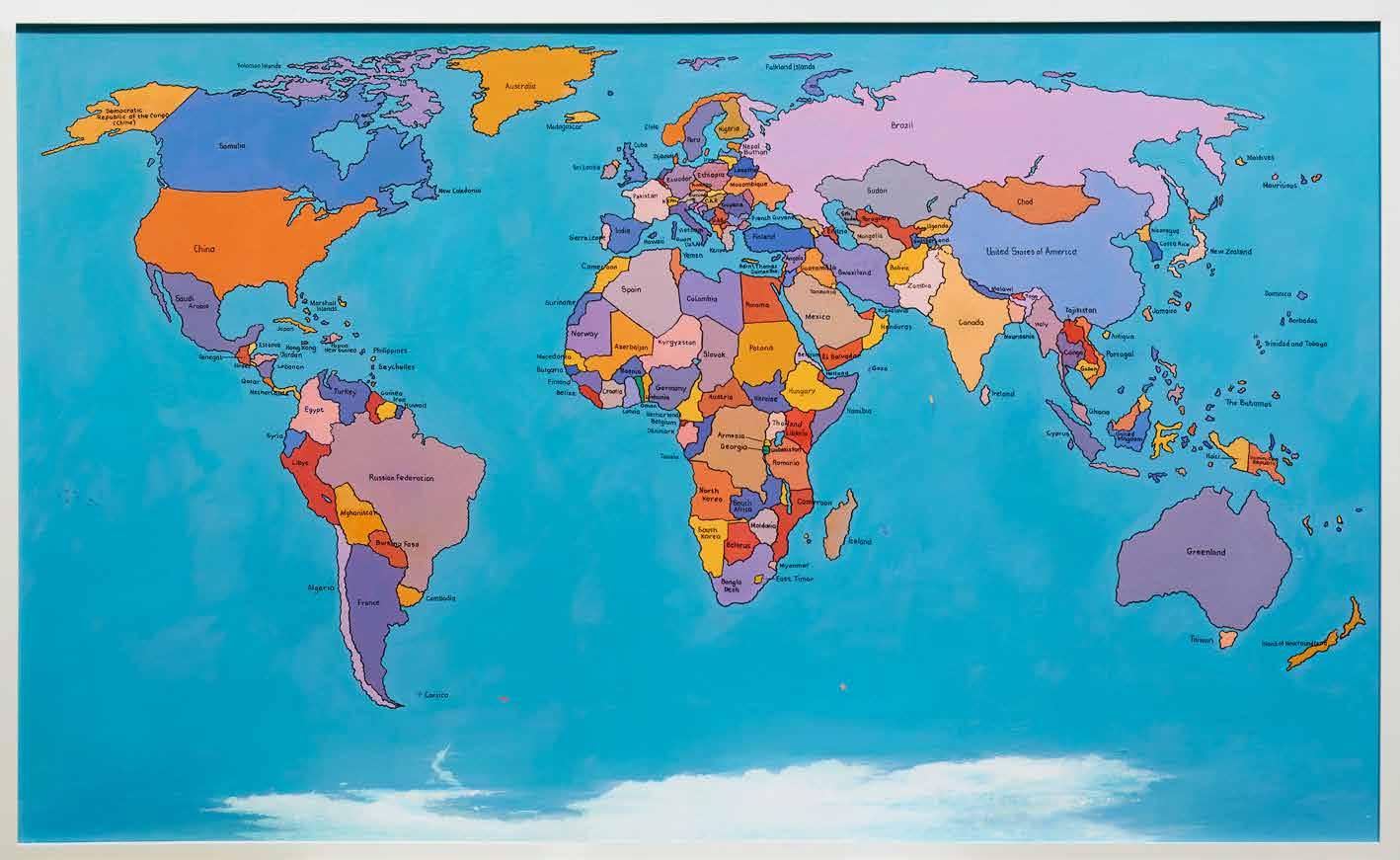
Finally, from this ‘wave’ come an older group of artists, who also trained and built their careers in postwar Britain, and were brought together under the controversial label, ‘a School of London’, a term famously coined by AmericanJewish artist, painter, printmaker, and draughtsman R. B.Kitaj, to describe a group of British-based figurative painters including, among others, Frank Auerbach, Leon
TAM JOSEPH
(b. 1947 Roseau, Dominica – lives in London, England and Nîmes, France)
The Hand Made Map of the World, 2013, Acrylic on board Ben Uri Collection. Purchased with the kind assistance of the artist 2016 Immigrated to Britain 1955
Kossoff, and himself. Kossoff’s fluent and heavily delineated dark, charcoal portrait of Romanian refugee Sonia Husid, known by her nom de plume N. M. Seedo, conveys her strength through suffering. In contrast, Kitaj’s late selfportrait employs a hot palette and his favoured square format in reworking a detail from Masaccio’s Florentine fresco The Tribute Money (c. 1425).
Child refugee from Nazism, Frank Auerbach, completes this group with his vibrant depiction of Mornington
Crescent in Camden Town, north London, where he has lived and worked for more than 70 years; he transforms the choking London traffic into a vigorous surge of pigment capturing the transient beauty of a fleeting summer’s day.
His Royal College of Art contemporary, Joash Woodrow, a recluse who struggled with his mental health, also transforms an everyday suburban scene into a shimmering, tactile landscape, rich with possibility and colour.
Artists from the ‘Hitler émigré’ generation in flight from Nazi persecution, predominantly but not exclusively Jewish, represent the second wave of migration to Britain. They include Polish-born Josef Herman, whose Refugees (1941), draws strongly on his eastern-European Jewish heritage but also represents the wider displacement of
(b. 1931 Berlin, Germany – lives in London, England)
Mornington Crescent, Summer Morning II, 2004, Oil on canvas
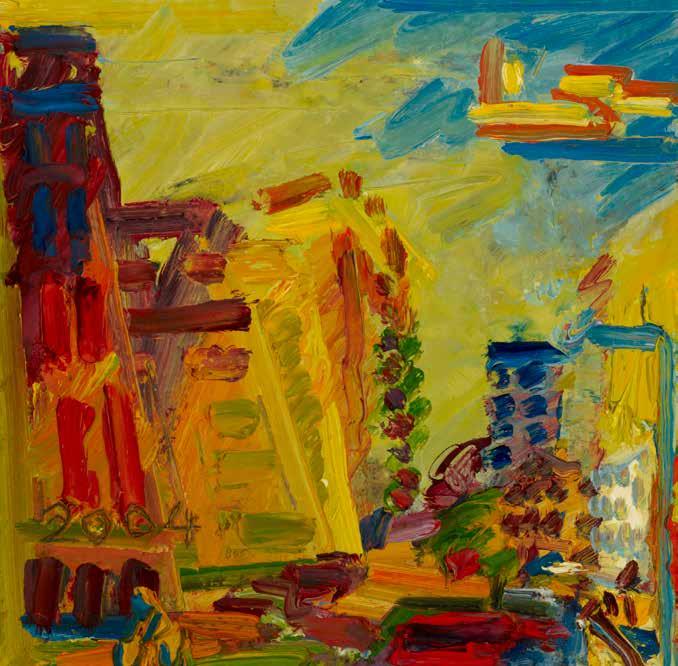
Ben Uri Collection. Acquired in 2006 through the support of Art Fund, MLA/ V&A Purchase Grant Fund, Daniel & Pauline Auerbach, Frank Auerbach and Marlborough Fine Art London
Immigrated to Britain 1939
(1911 Warsaw, Poland – 2000 London, England)
Refugees, c. 1941, Gouache on paper
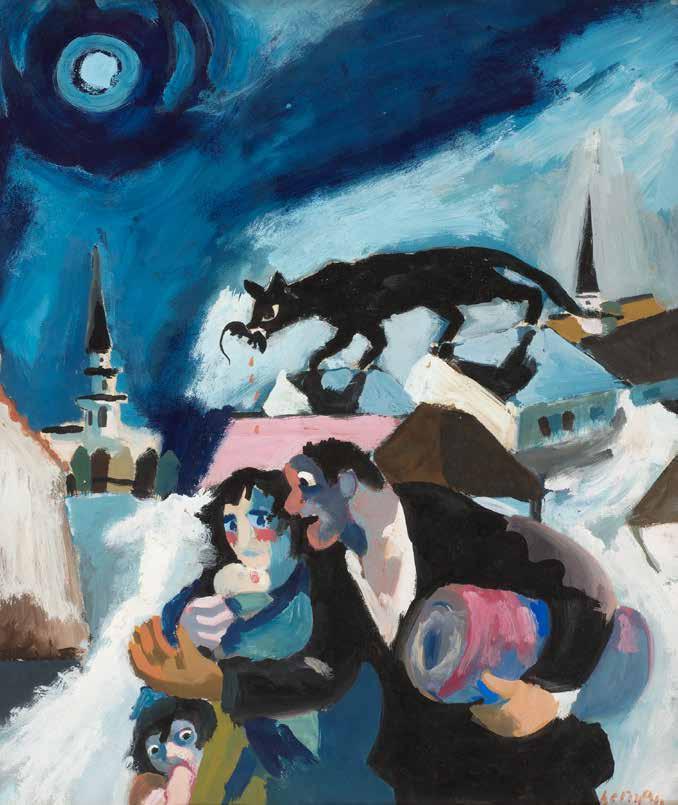
Ben Uri Collection. Purchased with the kind assistance of the ACE/V&A Purchase Grant Fund, Art Fund and the vendor via Conor Macklin of the Grosvenor Gallery 2014
Immigrated to Britain 1940
all peoples uprooted and exiled by the upheavals of war. His fellow Pole and close companion Jankel Adler’s tearful Mother and Child II (1940), cradling her child protectively, recalls Picasso’s Guernica (1937) and represents the painful separation from family experienced by so many refugees.
Their postwar plight is reflected in Refugees (1947), by Orovida (a third-generation painter from the Pissarro artistic dynasty); herself the subject of a striking portrait by Clara Klinghoffer, an immigrant from an earlier generation,
(née Orovida Pissarro, 1893 Epping, England – 1968 London, England)
Refugees, 1947, Oil on canvas
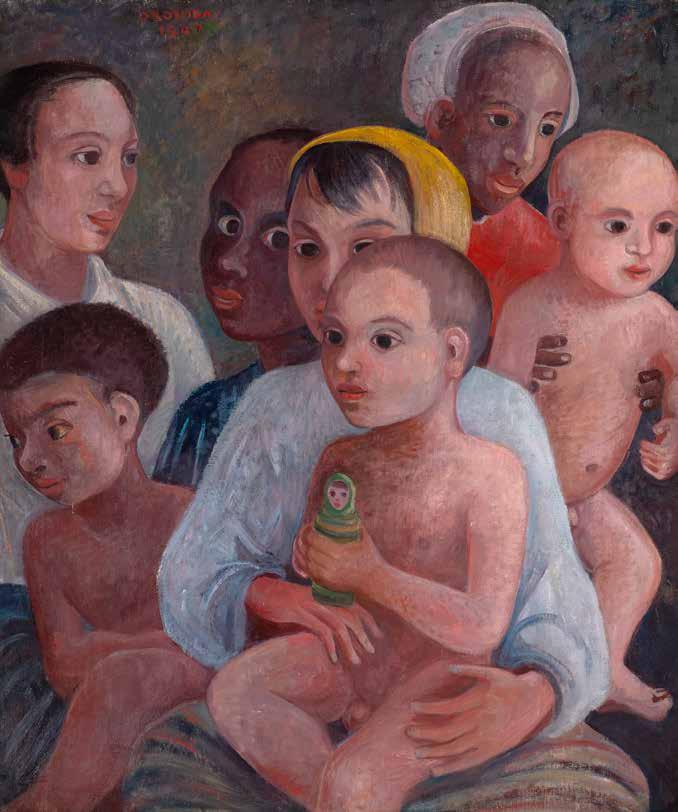
Ben Uri Collection. Purchased 2022 with the support of the Stern Pissarro Gallery
who spent the war in New York.
Others who found refuge beyond Britain during the Nazi era include German caricaturist George Grosz, also exiled in New York, where he painted his savage Interrogation. While commemorating Communist-Jewish writer Erich Mühsam’s torture and murder, it also represents all victims of the Nazi regime. Similarly, in England, Emmanuel Levy’s 1942 Crucifixion was a cri-de-coeur against Jewish persecution in mainland Europe. Marc Chagall, exiled, like Grosz in New York, following the German Occupation of France, responded with his own crucifixion, Apocalypse
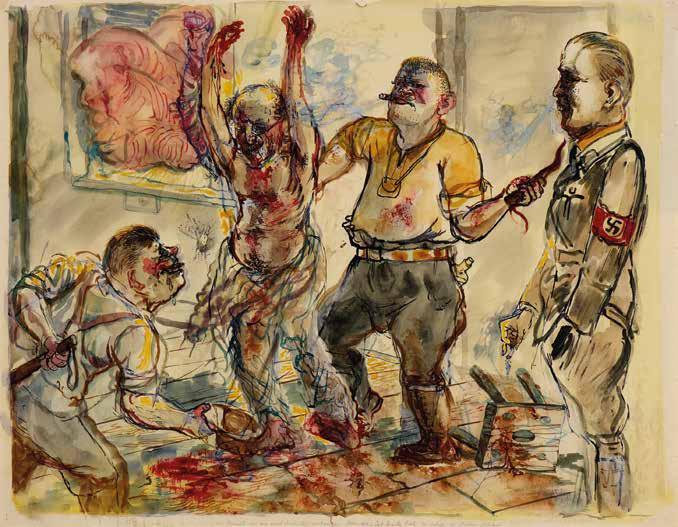
–Capriccio en Lilas , probably after seeing the Pathé newsreels uncovering the horrors of the concentration camps in April 1945.
Although fellow École de Paris juifs painter Chaïm Soutine remained in France, he was forced into hiding (dying in 1943 following a failed operation). He famously never made works relating to his Jewish background, but his anonymous maid, painted with typically expressive and tactile brushwork, was created in 1933, the year of Hitler’s accession to the German Chancellorship.
Other refugees from Nazism include German designer Elisabeth Tomalin, whose boldly coloured head, inspired by tribal masks and enamels, dates from her early studies at Berlin’s Reiman Schule, while Viennese émigrée MarieLouise von Motesiczky’s dramatically lit Circus composition demonstrates the looser, freer brushwork and softer, less angular style she developed in Britain after the war.
(né Georg Ehrenfried Groß, 1893 Berlin, Germany – 1959 Berlin, Germany)
Interrogation, 1938m Watercolour and ink on paper Ben Uri Collection. Acquired in 2010 with the assistance of Art Fund, the MLA/ V&A Purchase Grant Fund, Sir Michael and Lady Heller, Judit and George Weisz, Agnes and Edward Lee, and The Montgomery Gallery, San Francisco Immigrated to USA 1933
(1900 Manchester, England – 1986 London, England)
Crucifixion, 1942, Oil on canvas
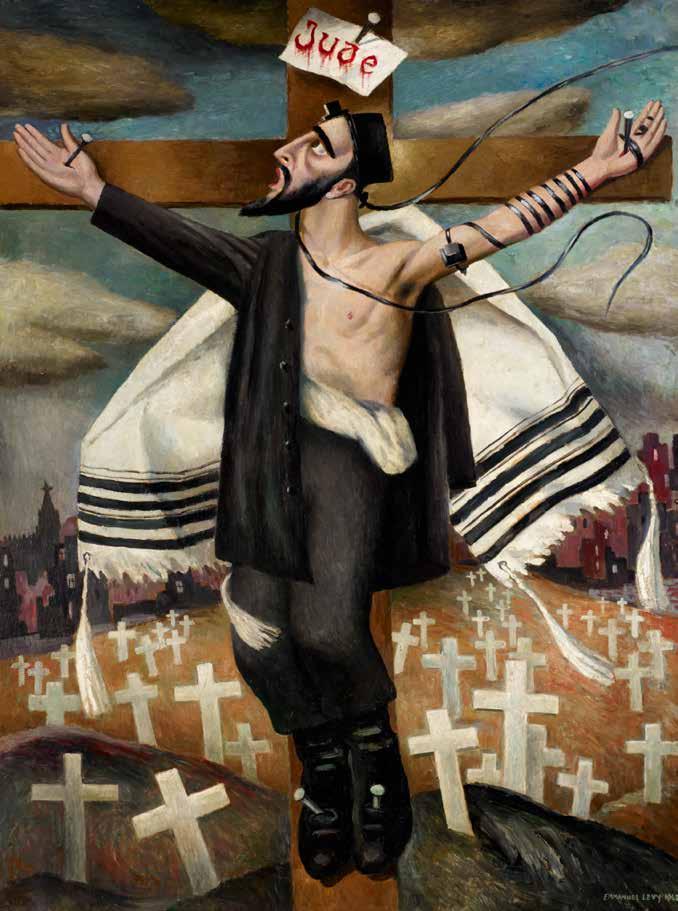
Ben Uri Collection. Purchased through the generous assistance of members of the Board of Ben Uri Gallery 2004
West Indian Waitresses by Eva Frankfurther, like Auerbach, a child refugee from Nazism, depicts her fellow workers at Lyon’s Corner House, Piccadilly, also documenting the arrival of the postwar ‘Windrush generation’, depicting them with empathy and dignity. However, Austrian-Jewish concentration camp survivor, Ernst Eisenmayer’s satirically
(1887 Vitebsk, Russia – 1985 Saint Paul de Vence, France)
Apocalypse en Lilas, Capriccio, 1945–47, Gouache, pencil, Indian wash ink and Indian ink on paper

Ben Uri Collection. Acquired in 2009 supported by Miriam and Richard Borchard, Sir Michael and Lady Heller, and a donor who prefers anonymity, and benefiting from the advice of Lionel Pissarro and Art Fund
entitled Law and Order, painted in 1962, reflects the racial discrimination endured by many.
Celebrated ‘Merz’ inventor Kurt Schwitters, whose pioneering collage technique repurposed found, frequently discarded materials, was also labelled ‘degenerate’ by the Nazis. He sailed to Britain from Norway in 1940 and after
(1920 Vienna, Austria – 2018 Vienna, Austria)
Law and Order, 1962, Oil on Board
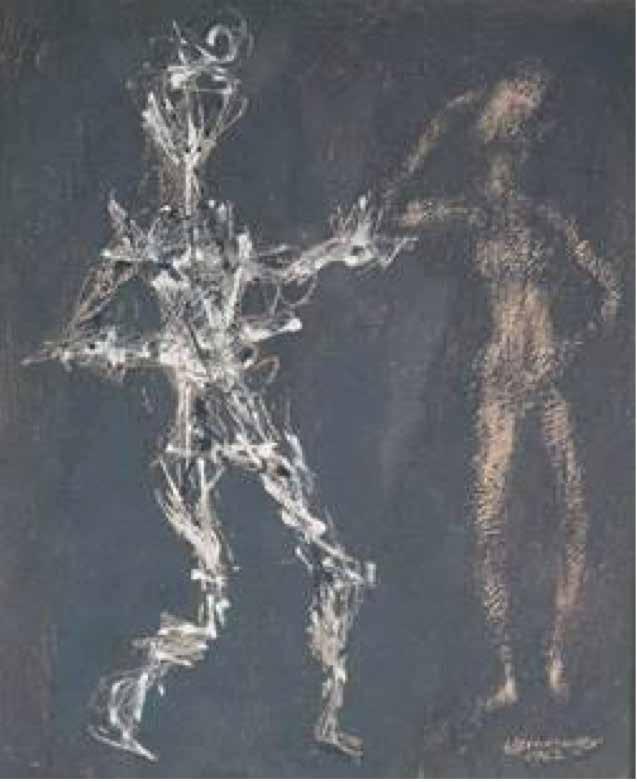
Ben
internment as a so-called enemy alien’ on the Isle of Man (1940-41), found refuge in the Lake District. His work is dedicated to the German-Jewish refugee sculptor Else Fraenkel, who brought it with her into exile in England. Her head of Chinese architecture student, Chungsen Chou, has much in common with the work of Latvian émigrée sculptor Dora Gordine, and her sensitively modelled head
(1930 Berlin Germany – 1959 London, England)
West Indian Waitresses, c. 1955, Oil on paper
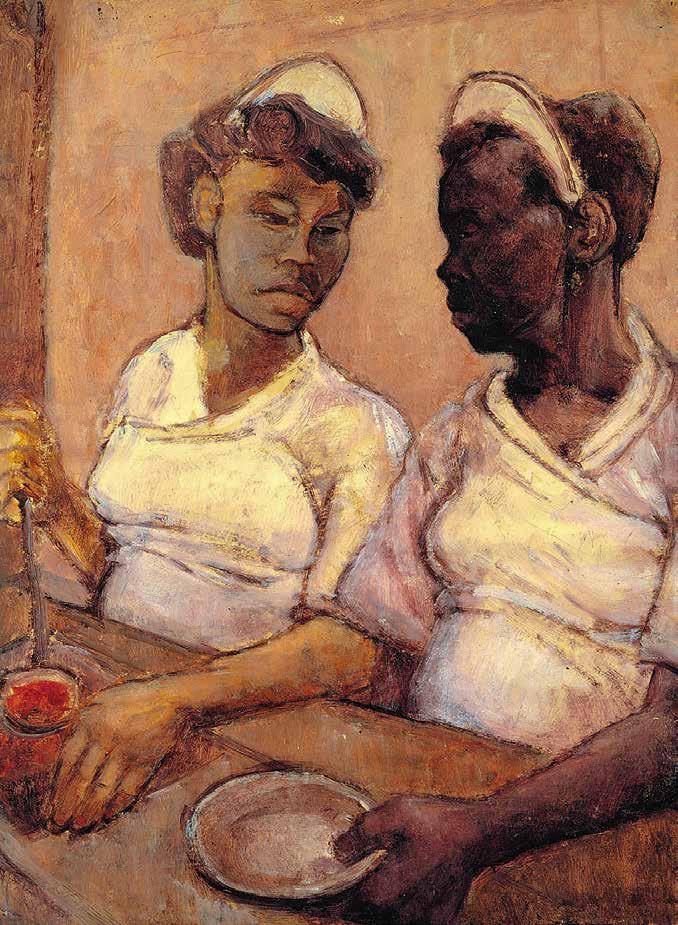
Ben Uri Collection. Presented by the artist’s sister, Beate Planskoy, 2015 Immigrated to Britain 1939
of an African woman, made in Paris in the 1920s.
Fellow sculptor Jacob Epstein, an earlier immigrant from an American-Russian Jewish background, presents two contrasting portraits: a smoothly rendered head of fellow artist Augustus John’s two-year-old son, Romilly, and a craggy bust of Leeds-born painter Jacob Kramer, capturing his famous nervous restlessness and energy.

(1887 Hanover, Germany – 1948 Kendal, Lake District, England)
Untitled: für Frau Fränkel, 1927, Collage on card
Ben Uri Collection. Purchased from the family of Else Fraenkel 2019 with reallocated proceeds from the sale of a deaccessioned work by David Bomberg previously purchased by Ben Uri
Immigrated to Britain 1940
Epstein represents a link to the first generation of Eastern-European Jewish immigrants and their children, the loose, informal group of ‘Whitechapel boys’, associated with London’s East End Jewish quarter, who studied at the Slade School of Fine Art, and engaged with early British modernism. David Bomberg’s radical Racehorses of 1913, made in an era of heady pre-First World War
(née Elsa Rothschild, 1892 Bensheim, Germany 1975 –Bangalore, India)
Head of Chungsen Chou, 1928, Bronze Ben Uri Collection. Presented by Leighton House Museum 2018 Immigrated to Britain c. 1933
optimism, demonstrates his understanding of European avant-garde movements including Cubism and Futurism, while Romanian-born Clare Winsten (née Clara Birnberg), the only ‘Whitechapel girl’, signals her own modernist affinities with her colourful, pared-down Vorticist Figures (c. 1911-12). Mark Gertler’s double portrait, Rabbi and Rabbitzin, evokes the wider Jewish diaspora, but also capture a


(1890 Birmingham, England – 1957 London, England)
Ghetto Theatre, 1920, Oil on canvas Ben Uri Collection. Purchased 1920
specific moment when the tension between traditional Jewish life in London’s East End was threatened by the incipient violence of the First World War. Poet-painter Isaac Rosenberg was fatally caught up in the conflict. His final, poignant Self-portrait in a Steel Helmet, drawn on cheap, crumpled, brown paper, probably salvaged from a parcel sent from home, was made while he was serving at the Front in Northern France in 1916, prior to his death, while
(1891 London, England – 1939 London, England)
Rabbi and Rabbitzin, 1914, Watercolour and pencil on paper Ben Uri Collection. Acquired in 2002 by private treaty through Sotheby’s with the assistance of Art Fund, HLF, V&A/MLA Purchase Grant Fund, Pauline and Daniel Auerbach, Sir Michael and Lady Heller, Agnes and Edward Lee, Hannah and David Lewis, David Stern, Laura and Barry Townsley, Della and Fred Worms and donors who prefer anonymity

on patrol, in 1918. Bomberg’s savage Ghetto Theatre, made after his own devastating war service, encapsulates his personal disenchantment, symbolised by the hunched male figure leaning wearily on his stick.
Finally, their forerunner, Alfred Wolmark, representing Ben Uri’s founding generation, closes the display with his monumental painting, The Last Days of Rabbi ben Ezra, showcased at his first solo exhibition in London in 1905,
(1890 Bristol, England – 1918 Fampoux, France) Self-Portrait in Steel Helmet, 1916, Black chalk, gouache, and wash on paper Ben Uri Collection. Acquired in 2009 with the assistance of Art Fund, the MLA/V&A Purchase Grant Fund and donors who prefer anonymity
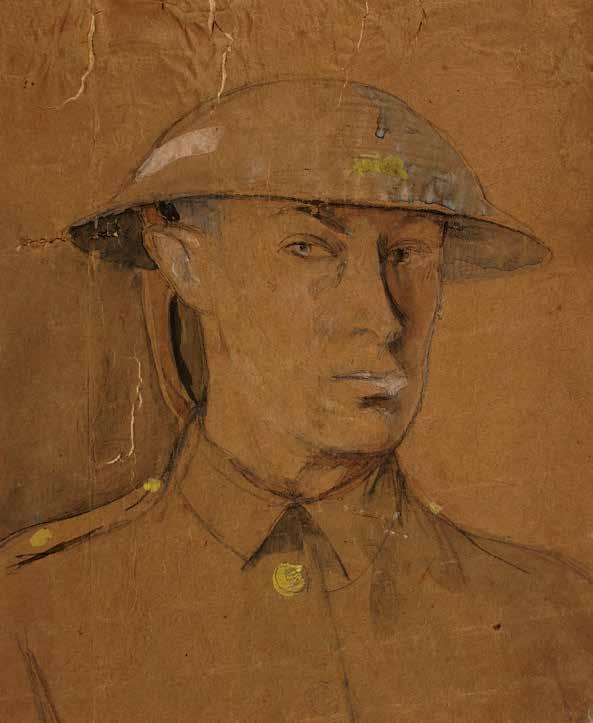
(née Clara
Birnberg, 1892
Romania – 1989
London, England)
Untitled (Vorticist Figures), c. 1911-12, Oil on canvas Ben Uri Collection. Presented by Liss Fine Art 2008

Immigrated to Britain 1902
the year of the British ‘Aliens Act’, designed to stem the tide of Jewish immigration at source. This remarkable painting can be seen as an act of cultural identity, reconciling his Polish, Jewish and English roots, but it also brings us full circle to today’s contemporary stories of art, identity, and migration.
Sarah MacDougall, Director(né Aaron Wolmark, 1877 Warsaw, Poland – 1961
London, England)
The Last Days of Rabbi ben Ezra, 1905, Oil on canvas

R. Guggenheim and family, on long term loan to Ben Uri Collection
Immigrated to Britain 1883

Ben Uri in London at the gallery
In response to the partnership with the National Gallery’s digital exhibition Fruits of the Spirit that pairs Ben Uri’s Mornington Crescent Summer Morning II by Frank Auerbach with its Sunflowers by Vincent Van Gogh. Museum
30 seminal works from the Ben Uri Collection illustrating the rich influence on visual culture by Jewish and immigrant artists including Auerbach, Bomberg, Chagall, Enwonwu, Epstein, Frankfurther, Gertler, Grosz, Herman, Joseph, Narielwalla, Orovida, Pissarro, Ribeiro, Schwitters and Soutine.
35 new arrivals to the Ben Uri Collection including Chagall, Kitaj, Mayer-Marton, Narielwalla, Nessler, Ribeiro, Sher, Solomon, Topolski, Ullman and Wolmark.
A new initiative focussing in depth to explore the many layers of engagement generated by this contemporary reflection. Laura
Exploring both her appointment as an official War Artist to record this historically important moment and the significance of the art produced.
Sheer
The Women’s International Art Club was founded in Paris in 1898 as an exhibition platform and networking forum for women artists. This loan exhibition celebrates its 125th anniversary with artists including Delaunay, Colquhoun, Hepworth, John, Moss and Rego.
Please check benuri.org for further information and opening times of all exhibitions and explore the first full scale virtual museum incorporating more than 40 exhibitions, 100 art videos and podcasts, 10,000 pages of archives and more, alongside the Ben Uri Collection at benuricollection.org.uk and the Ben Uri Research Unit for the study and digital recording of the Jewish and immigrant contribution to British visual culture since 1900 at buru.org.uk
Ben Uri works on loan or tour across the United Kingdom
Kensington, Leighton House ALL YEAR Hidden Gem to National Treasure: Solomon J Solomon
Winchester, The Arc UNTIL 12 FEB
Aberystwyth, Arts Centre UNTIL 29 JAN
Marc Chagall, Self Portrait and A Farewell to Art, Shakespeare and Prospero
Refugees from National Socialism in Wales; Hugo Dachinger, Josef Herman and Harry Weinberger
Cardiff, Sensed Cymru 18 FEB – 19 APR Extended tour of Refugees from National Socialism in Wales
Hastings Contemporary
7 OCT – 7 JAN 2024 Soutine and Kossoff; Chaim Soutine Jeune Servant
Ben Uri works on tour across Europe and the USA
Germany, Frankfurt, Schirn Kunsthalle
Norway, Oslo, Henie Onstage Centre
Germany, Nuremberg, Germanisches Historisches Museum
Italy, Milan, Museo del Novocentro
France, Roubaix > Spain, Madrid > France, Nice
USA, Zimmerli Art Museum, New Jersey
UNTIL 19 FEB
Chagall. World in Turmoil: Marc Chagall
Apocalypse en Lilas: Capriccio
16 MAR – 18 JUN Extended tour of Chagall. World in Turmoil
23 MAR – 11 SEP
Horizons: People on the move. Frank Auerbach, Alfred Lomnitz, Walter Nessler
6 APR – 3 SEP
7 OCT – 16 SEP
2024
Futurliberty, The early avant-gardes; David Bomberg, Clare Winsten
Marc Chagall: The Cry of Freedom, Apocalypse en Lilas, Capriccio
11 FEB – 31 JUL Komar and Melamid: You Are Feeling Good. Yalta installation
Using Art Differently makes Ben Uri Distinctive within the British museum sector.
Ben Uri surpasses ethnic, cultural and religious obstacles to engagement within the arts sector, addresses contemporary and historical issues of identity and migration, and celebrates, researches and records the richly diverse Jewish and immigrant contribution to the British visual arts since 1900.
Presenting and sharing art differently, we encourage people to explore their own and their community’s identity and creativity. We engage and deliver this outcome through three distinctive and fully interlinked divisions.
B Research including collections, exhibitions and publications
B Arts and Mental Health focusing on the growing 70+ demographic
B Digital engagements to share Ben Uri with an exponentially growing global audience
Ben Uri Research Unit has created the country’s first digital resource that comprehensively records the Jewish and immigrant communities contribution to the visual arts in Britain since 1900. This is a core, long term, ongoing project and commitment.
Some 650 profiles of eminent and, in many cases, neglected or forgotten individuals from 104 different countries of birth have been published on buru.org.uk.
As of January 2024 we forecast over 1,000 profiles and by January 2025 we forecast at least 1,500 profiles creating the largest specialist digital educational resource accessible for free online.
We believe the final quantum of relevant profiles will exceed 3,000.
Users who benefit from using this important resource include students, teachers, lecturers, artist families, gallerists, auction houses, researchers, journalists and social inclusion strategists.
buru.org.uk

Ben Uri Arts and Health Institute represents a core commitment to developing researched and evaluated art interventions for older people in care settings and in the community, with a particular focus on anyone living in social isolation or with dementia. The Ben Uri collection is at the heart of this creative outreach programme. Interpreting high-quality art into replicable, cost-effective art discussion and art making sessions, with an accompanying training programme for carers, in turn enables the gallery to reach a broader, more diverse audience and play an important role in maintaining cognisant awareness.
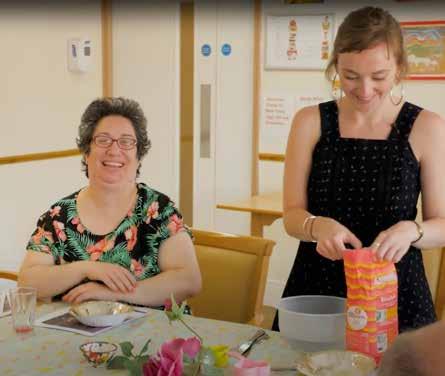
This decade long objective is to identify through research and evaluation
why and what are the elements of an art work that trigger the most engagement and responses from those who live in social isolation and/or with dementia, and how best in terms of cost and effectiveness to disseminate such programmes with the 70+ demographics, of which 95% live in their own homes or with family.
We have already published some 100 different evaluated programmes online at benuri.org/artsandhealth , as well as ‘how to’ training films and toolkits. We have established that the most cost-effective means of engaging the growing 70+ demographics, currently over 7 million in the UK, and forecast to double in quantum and percentage of population, is through the digital format. This is our principle objective.
Ben Uri is greatly proud to have been invited to sit alongside many of the world’s finest art collections within the World Art Foundations.
The Foundations include The Henry Moore Foundation, The Getty, The Picasso, The Guggenheim, The Warhol, The Dali, The Dubuffet, The Cragg, The Giacometti, and The Maeght, amongst 200 others.
Enhancing our vibrant gallery
80+ online and 3D exhibitions
60+ exhibition catalogues and research papers
50+ podcasts and interviews
200+ school and family programmes
100+ art and mental health interventions
100+ films and artist insights
Open 24/7
A vibrant gallery in St. John’s Wood, London NW8, engaging simultaneously with the full scale virtual museum benuri.org and a research institution
programming in London
850+ artworks
600+ research unit profiles
400+ artist biographies
500+ archival exhibition records since 1925
10,000+ pages of archives from 1915
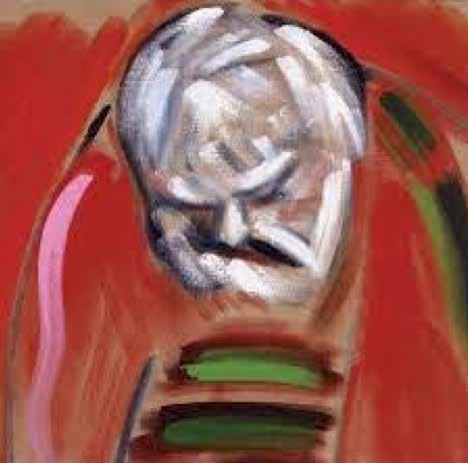
Until 17 February
A physical response to Ben Uri’s digital partnership with the National Gallery who have paired our Mornington Crescent, Summer Morning II by Frank Auerbach with their Sunflowers by Vincent van Gogh. Part of the exhibition will be presented by refugee artists from the New Art Studio in London.
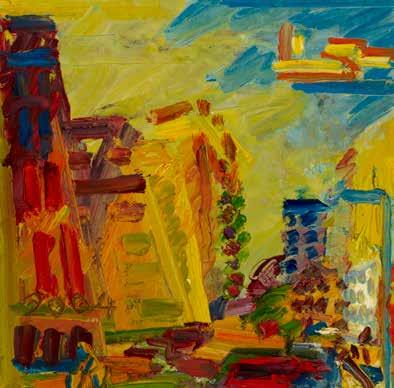
New Arrivals at Ben Uri 1 March to 2 June 35 New Arrivals to the Ben Uri by artists including Chagall, Kitaj, Mayer-Marton, Narielwalla, Nessler, Ribeiro, Sher, Solomon, Topolski, Ullman and Wolmark.
Opening Monday and Tuesday for schools and groups only. Wednesday to Friday 10am to 5.30pm open to all.
108a Boundary Road, Off Abbey Road, St. John’s Wood, London NW8 ORH Contact: admin@benuri.org This